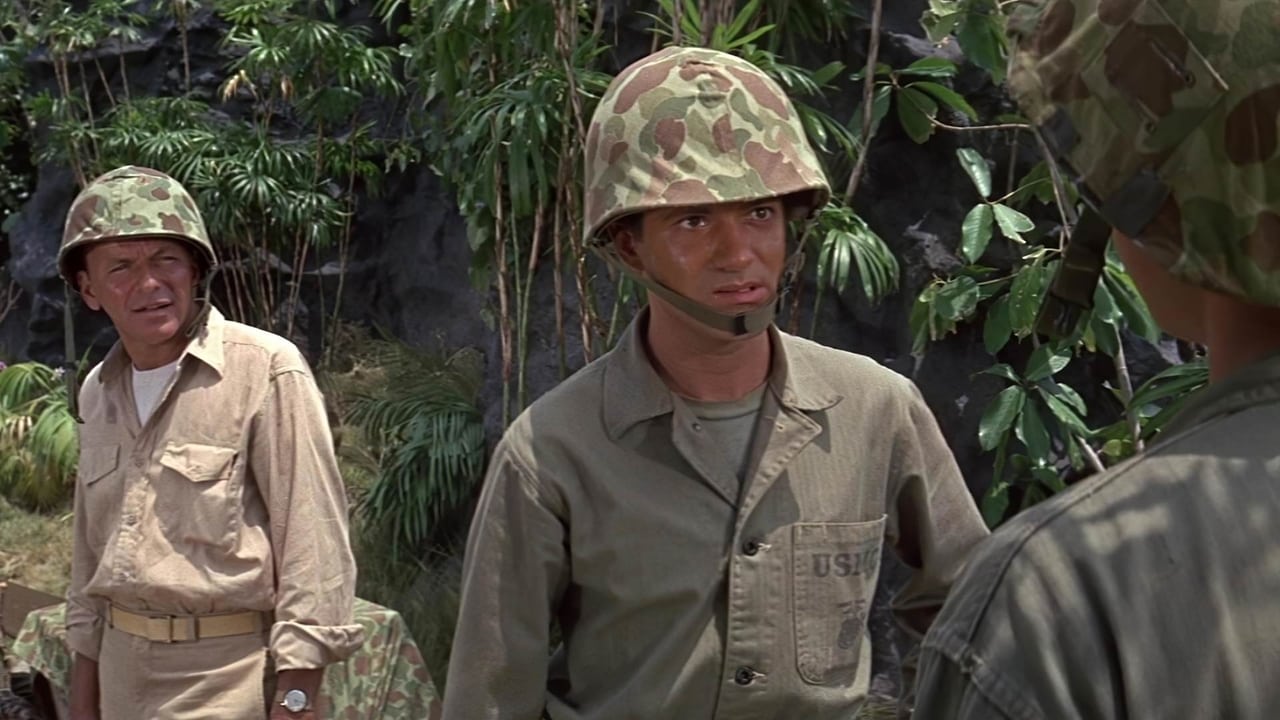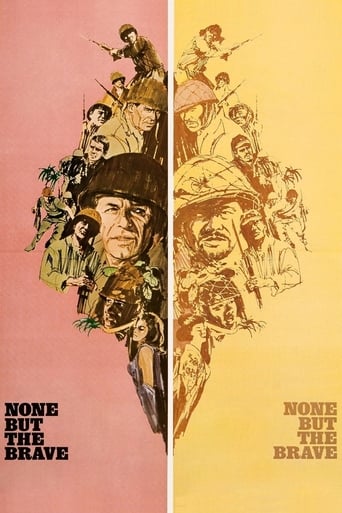Karry
Best movie of this year hands down!
Actuakers
One of my all time favorites.
DipitySkillful
an ambitious but ultimately ineffective debut endeavor.
Teddie Blake
The movie turns out to be a little better than the average. Starting from a romantic formula often seen in the cinema, it ends in the most predictable (and somewhat bland) way.
dartleyk
an old idea done better in many other movies, i.e opposing sides find themselves in the same boat and fight and wonder why; odd part if the several misplaced performances; start with sinatra doing the typical club singer vegas performance except in uniform in the south pacific; follow that with the most bizarre- tommy sands, then a teen idol singer (oh, and sinatra's son in law) who was a little person with a little voice somehow not realizing what a fool he was acting by pretending to be a big tough marine booming out orders; it's just laughable; anyway, the best version of this is lee marvin in hell in the pacific; still a war movie but thoughtful, interestingly shot
vitaleralphlouis
Twenty years after the Japanese surrender, Frank Sinatra and other Hollywood empty-heads decide to create this dreadful movie which dishonors all the wonderful Americans who fought in the war, as well as their families and other Americans who worked tirelessly to keep our country together during the double-war with Japan and the Nazis.NOBODY EVER WINS is the message. Imperial Japan was the moral equivalent of America; as were the Nazis. Who thinks up this crap? I saw this anti-American junk movie in 1965 and forgot how awful it was, recently watched it again 07/04/11. I'm sorry; I ought to have remembered and not disrespected our dead hero's.
writers_reign
On the face of it this is about as simplistic as it gets. Frank Sinatra had already made one plea for tolerance via the short film The House I Live In for which he received a 'special' Oscar and now, exactly twenty five years later, he says much the same thing as a director. Perhaps perversely he himself is the only major Hollywood actor to be seen and surrounds himself with Bush League talent like Clint Walker, Tony Bill, Brad Dexter and his then son-in-law Tommy Sands. This disparate group crash land on a Pacific island inhabited by a forgotten Japanes platoon during World War Two. Essentially the two groups learn that they are all human beings and make a pretty good fist at co-existing until the inevitable day when the outside world intrudes with senseless killing only a heartbeat behind. Simplistic it may be but it does offer a message well worth peddling.
bkoganbing
It's probably a mistake to say that this is Frank Sinatra's only effort at directing. Truth be told, starting with Ocean's 11, he directed about half the films he was in, whoever's name is in the credits was just a puppet. Frank was also producing as well, probably though he didn't want the public to get the idea he was Orson Welles.Maybe it would have taken an Orson Welles to have made None But the Brave a classic film, but Sinatra in his only formal effort at directing doesn't do a bad job except for his then son-in-law Tommy Sands. In fact he anticipates Clint Eastwood's Iwo Jima films by 40 years.This isn't Iwo Jima exactly, it's a small backwater island in the Pacific where a squad of Japanese soldiers have been cut off and are living off the land so to speak. A Navy transport plane is shot down with a squad of U.S. Marines on board. Pilot Clint Walker crash lands safely on that selfsame island and saves most of them, but they are also cut off. After a lot skirmishing mostly between Walker and Sands with Walker trying to prevent newly commissioned second lieutenant Sands from doing something stupid like charging the Japanese headlong, the two groups agree to opt out of World War II. An interesting thing happens, both find that they have a lot in common. We already know that in seeing the film from the Japanese point also with subtitles.The Japanese players are unknown to we occidentals for the most part, but I looked and found several like, Tatsuya Mihashi as the Japanese commander, Takeshi Kato as their sergeant, and Homere Suguro as the corporal who has his leg amputated by Frank Sinatra had substantial careers in Japanese cinema. The player on that side I liked most however was Ryucho Shunputei as the simple Japanese private who fishes and quite frankly is the key to their survival. I'm betting he wasn't exactly in the Samurai tradition in combat, but his skill at the profession he left behind is keeping his whole group alive.For himself Frank Sinatra took the part of a Navy Corpsman who is the only non-Marine beside Walker on the American side. The part fits him quite well indeed. This was the film where Brad Dexter who's the Marine sergeant in the film saved Frank Sinatra from drowning when old Blue Eyes was swimming and was nearly swept out to sea by the undertow. Bing Crosby's son Phil had a small role as one of the Marines, no doubt a favor from Old Blue Eyes to the Old Groaner.Frank Sinatra could be vindictive however and I had never thought about it before, but another reviewer's comments about Tommy Sands made me reconsider his performance. Maybe Frank was actually trying to mess his career up. Sands as the green second lieutenant is almost a caricature of one. He's so bad in the role, maybe it was lousy directing for him only.Other than that, Frank did not do a half bad job. It's not a great film, but it's not bad either and it does raise some interesting questions about people in combat situations.

